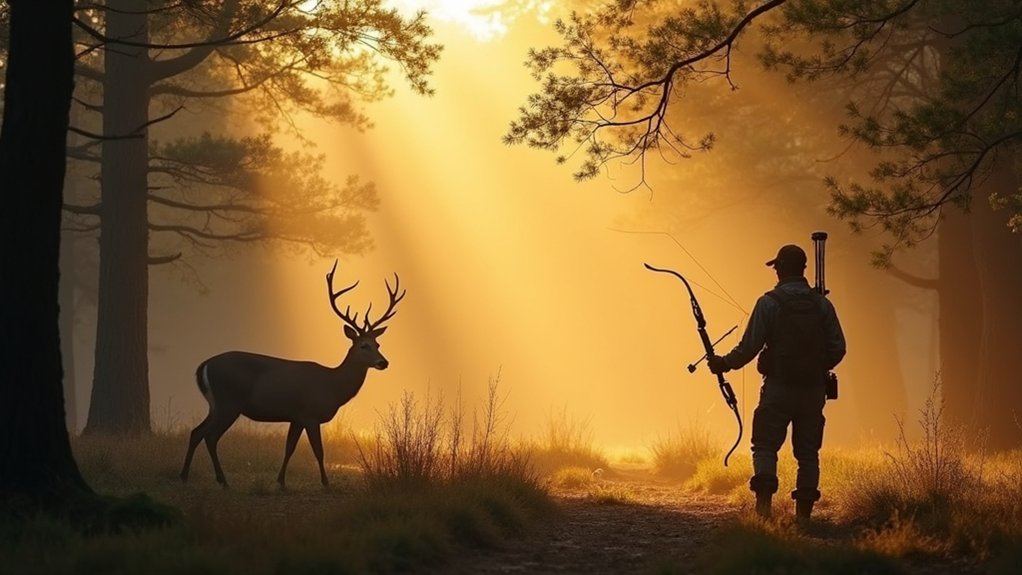Ethical hunting debates spark important conversations about our relationship with wildlife. You might find yourself questioning whether regulated hunting truly benefits conservation efforts or if it prioritizes sport over animal welfare. As perspectives shift, understanding the complexities of these debates is essential. So, what are the key arguments on both sides, and how do they shape our views and policies on hunting? Let’s explore these pressing questions.
What Are Ethical Hunting Debates and Why Do They Matter?
While many people enjoy the outdoors, ethical hunting debates raise important questions about morality, conservation, and animal rights. These discussions explore whether hunting can be justified, considering the impact on animal populations and ecosystems.
You might find yourself grappling with the balance between tradition and modern ethical standards. Proponents argue that responsible hunting can promote wildlife management, while opponents highlight the suffering inflicted on animals.
These debates matter because they shape laws, influence public perception, and affect conservation efforts. Understanding the nuances helps you form informed opinions on a practice that’s as controversial as it’s historic.
How Do Ethical Hunting Practices Impact Wildlife Conservation?
Ethical hunting practices can play a significant role in wildlife conservation efforts. When you hunt sustainably, you help manage animal populations, preventing overpopulation and habitat degradation. This guarantees ecosystems remain balanced and healthy.
Additionally, your participation can generate funding for conservation projects through licenses and fees. These funds often support habitat restoration and research initiatives that protect endangered species.
What Are the Key Arguments For and Against Ethical Hunting?
Hunting can ignite passionate debates, as advocates and opponents present compelling arguments for and against its ethical implications.
Supporters argue that ethical hunting promotes wildlife management, contributes to conservation funding, and fosters a connection to nature. They believe responsible hunting can help maintain healthy animal populations.
Conversely, opponents claim it causes unnecessary suffering, disrupts ecosystems, and can lead to overhunting. They argue that ethical concerns outweigh potential benefits.
Ultimately, you must weigh these perspectives, considering both the ecological impacts and moral considerations surrounding hunting practices, to form your own opinion on the ethics of hunting in today’s world.
How Do Cultural Perspectives Influence Ethical Hunting Debates?
Cultural perspectives shape the ethical hunting debate greatly, as different societies hold varying beliefs about the relationship between humans and wildlife.
In some cultures, hunting is seen as a rite of passage or an essential means of sustenance, while others view it as an act of cruelty. These views influence laws, community practices, and individual behaviors.
You might find that indigenous communities often emphasize respect for nature, promoting sustainable practices. Conversely, urban populations may focus on conservation efforts and animal rights.
Understanding these cultural contexts is significant in maneuvering the complexities of ethical hunting discussions and finding common ground.
Why Is Public Perception Crucial in Ethical Hunting Discussions?
While many factors shape the discourse around hunting, public perception plays a pivotal role in determining how ethical questions are addressed.
When you think about hunting, your views can influence legislation, conservation efforts, and hunting practices. If the public sees hunting as cruel, pushback can lead to stricter regulations or even bans. Conversely, if you recognize its role in wildlife management or cultural traditions, support for ethical hunting may grow.
Engaging in open discussions helps bridge the gap between hunters and non-hunters, fostering understanding and promoting responsible practices.
Ultimately, your perspective can shape the future of ethical hunting conversations.
What Role Does Legislation Play in Shaping Ethical Hunting Practices?
Legislation greatly influences ethical hunting practices by setting the rules that govern what’s permissible. These laws can dictate hunting seasons, bag limits, and protected species, ensuring sustainable practices.
When you follow these regulations, you help maintain wildlife populations and habitats. Additionally, legislation often incorporates public sentiment about animal welfare, reflecting society’s evolving views on ethics.
By enforcing penalties for violations, laws deter unethical behavior among hunters. Ultimately, you play an essential role in upholding these standards, contributing to a culture of responsible hunting.
Engaging with lawmakers can further promote ethical practices and enhance conservation efforts.
How Can Hunters Make More Ethical Choices in Their Pursuits?
To make more ethical choices in your hunting pursuits, it’s crucial to prioritize respect for wildlife and the environment.
Start by educating yourself about local ecosystems and the species you hunt. Always follow regulations, ensuring you hunt sustainably and responsibly.
Use ethical hunting methods that minimize suffering and waste. Consider hunting with a goal in mind, such as population control or habitat conservation.
Engage with local conservation groups to support initiatives that protect wildlife.
Finally, reflect on your motivations and the impact of your actions, working to foster a deeper connection with nature and a commitment to ethical practices.
What Future Trends Could Shape the Ethical Hunting Landscape?
As hunters increasingly focus on ethical practices, future trends are likely to reshape the hunting landscape dramatically.
You’ll notice a rise in technology, like drones and apps that track animal populations and migration patterns, promoting sustainable hunting.
Additionally, social media platforms will amplify the conversation around ethics, encouraging hunters to share their experiences and practices.
More hunting organizations might prioritize conservation efforts, fostering a sense of community responsibility.
Finally, as climate change impacts wildlife habitats, you’ll need to adapt your strategies, emphasizing respect for nature and conservation.
These trends could lead to a more responsible and informed hunting culture.
